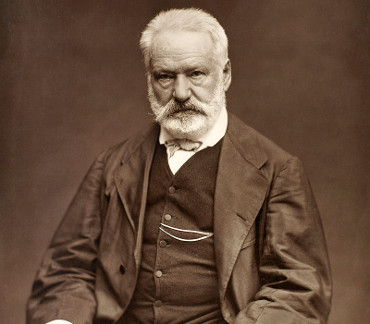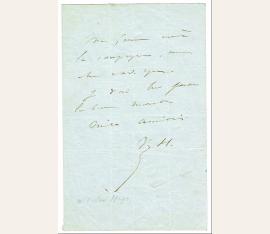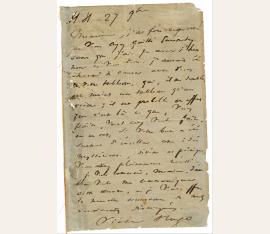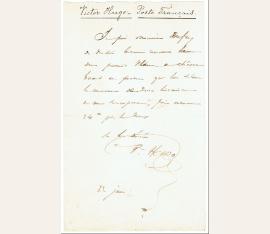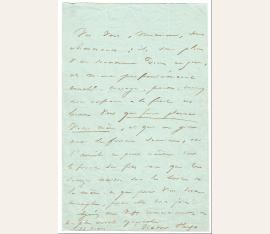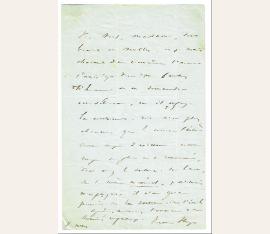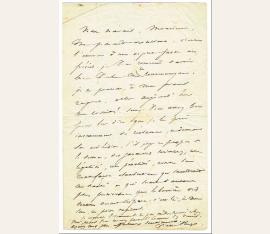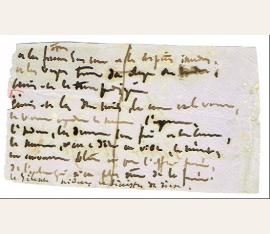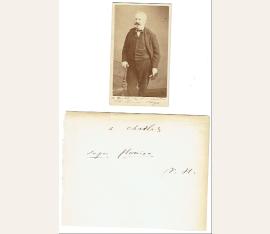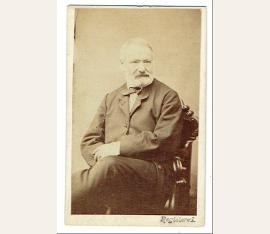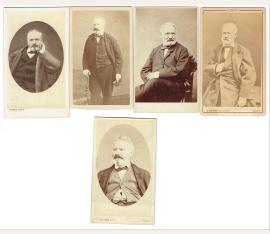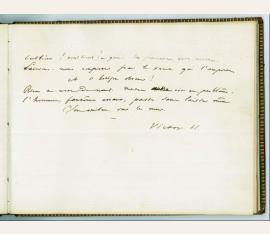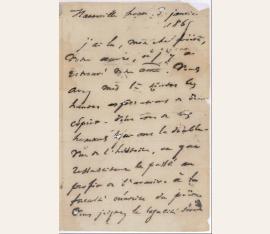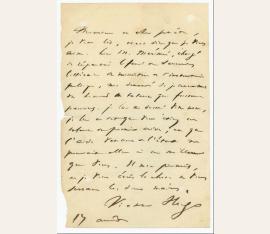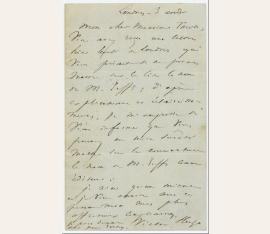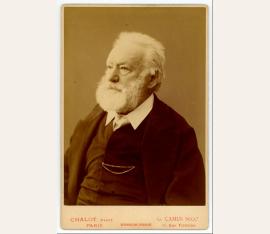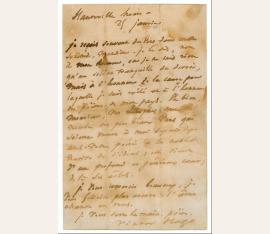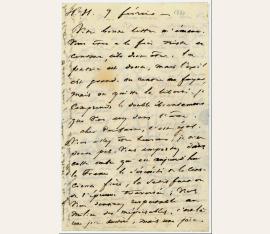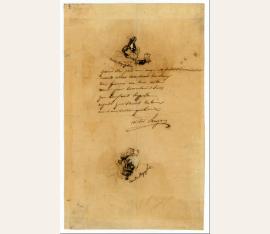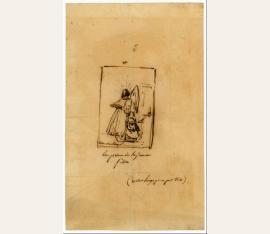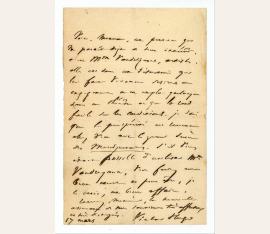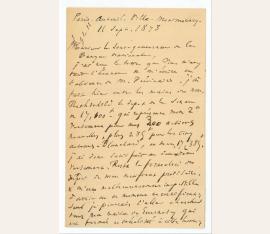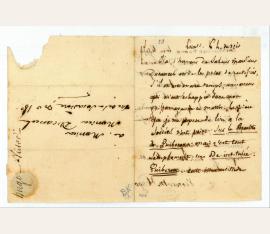französischer Schriftsteller (1802-1885).
ALS in French, signed “V. H.” Ohne Ort. 8vo. 1 p. Mit Adresse.
$ 2,143 / 2.000 €
(44297)
Letter to his cousin Adolphe Trebuchet. In full (translated): “My wife is in the country, my dear Adolphe. I'll pass him the good news.” Addressed on the reverse of the second integral page in Hugo’s hand. Several intersecting folds and scattered staining, otherwise fine condition. Six days later, Hugo would leave for La Manche to spend the summer with his mistresses, Juliette Drouet and Celestin Nanteuil, about which he wrote the poem ‘At Granville, en 1836.’
writer (1802-1885). A.L.S. H.H. [Hauteville House]. 8vo. 1 page.
$ 2,143 / 2.000 €
(47509)
Letter to a gentleman. (translated): “I do regret that you left Guernesey without me being able to have the honor to greet you. I would have be interested to share with you about our painting, it seems to me, it is less a painting than a poem and it is likely indeed that is what you [intended]…In this case…You have fully succeeded. Thank you, Sir, for ...... giving me this piece of work.” In good to very good condition, with intersecting folds, one through a single letter of signature, tape repairs along left edge, lightly affecting a few words of text, several small areas of ink erosion, chipping to edges, and a mounting remnant along reverse of left edge.
French writer (1802-1885). Autograph letter signed. n. p. 8vo. 1 page.
$ 4,821 / 4.500 €
(61223)
Very early letter of the young Hugo: „Je prie Monsieur Dufay de vouloir bien remettre les deux premiers volumes de Chateaubriand, au porteur de la lettre qui lui soldera le montant de deux livraisons de sa souscription. […]“
French writer (1802-1885). Autograph letter signed. [Paris]. 8vo. 1 page. With holograph address.
$ 4,821 / 4.500 €
(61224)
Aufmunternder Brief von Hugo an seinen Freund Ulbach für dessen erste Gedichtsammlung ,Gloria’: „Vos vers […] sont charmants: ils sont pleins d'un sentiment divin et grave; ils m'ont profondément touché. Il l'encourage à les faire publier; Courage poëte. Donnez avec confiance à la foule ces beaux vers qui font pleurer votre mère, et qui un jour aussi la feront sourire, car l'auréole ne peut naître sur le front du fils sans que le sourire naisse sur les livres de la mère. Ce qui pour vous sera triomphe, pour elle sera joie […]“
French writer (1802-1885). Autograph letter signed. n. p. 8vo. 1 page.
$ 3,750 / 3.500 €
(61524)
To Mrs. Eriane Dibol „Vos vers, madame, sont beaux et nobles, et je serais charmé d’en connaître l’auteur. L’avis que vous me faites l’honneur de me demander est délicat, car il engage la conscience. Rien n’est plus chanceux que la carrière littéraire comme moyen d’existence. Comme moyen de gloire et de renommée, vous avez le talent. Sur le reste, sur le succès matériel, je n’oserais m’expliquer. Il n’est qu’un pouvoir de la destinée – c’est l’étoile […]“
French writer (1802-1885). Autograph letter signed. N. p. o. d. 8vo. 1 page.
$ 3,750 / 3.500 €
(61525)
He thanks his correspondent for having forwarded his work, which seems to be excellent„[…] l’oeuvre d’un esprit juste et précis. [...] Je ne pourrai, à mon grand regret, aller aujourd’hui au comité. Serezvous assez bon pour lui dire que je le prie instamment de réclamer, en donnant son adhésion, s’il juge à propos de la donner, des garanties sérieuses, une légalité, une pénalité, contre la contrefaçon clandestine qui survivrait au traité et qui serait d’autant plus pernicieuse que la barrière des douanes aurait disparu. C’est là, à mon sens, le point capital […]“
French writer (1802-1885). 2 Autograph manuscripts unsigned. 8vo. 2 pp.
$ 4,821 / 4.500 €
(61527)
Une au dos d’un feuillet à son adresse. COPEAUX POETIQUES, ou brouillons de premier jet pour des poèmes, biffés après avoir été copiés. Le premier, d’une dizaine de vers, a été intégré, avec variantes, dans Religions et religion (IV, Des voix), publié en 1880 : « Connais-tu les deux nuits, la mort et la vivante, La vivante engendrant le monstre, l’épouvante, L’hydre, les dévorant sans fin et les créant, La morte, c’est-à-dire un vide, le néant »... Le second, de 7 vers, a été repris avec variantes dans Dieu (II L’océan d’en haut, VI ; posthume, 1891) : « Ô Dieu ! roi ! maître ! asile ! espoir du criminel ! Éternel laboureur ! Moissonneur éternel ! Père à la première heure et juge à la dernière ! »...
En marge figurent quelques notes, et cet alexandrin : « Comme il est l’invisible, il est l’éblouissant »....
Schriftsteller (1802-1885). Portrait photograph with autogr. inscription and signature. o. O. u. D. 104 : 60 mm.
$ 4,821 / 4.500 €
(63195)
Dedicated to Charles Helvault. - Accompanied by billett with autograph signature "A Charles, Super Flumina, V. H".
franz. Schriftsteller (1802-1885). Exceptional 2.5 x 4 carte-de-visite portrait of Victor Hugo signed verso Hauteville House. 100 : 65 mm.
$ 3,214 / 3.000 €
(80107)
Exceptional 2.5 x 4 carte-de-visite portrait of Victor Hugo seated in a chair by Arséne Garnier of Guernsey, boldly signed on the reverse in bold black ink, „Pro jure contra legem., Victor Hugo, H. H. 1866“. In fine condition. Victor Hugo lived at Hauteville House in Guernsey, an island in the English Channel off the coast of Normandy, during his exile from France, from October 1855 to 1870. He was driven from his home by Napoleon III's coup of 1851, as Hugo openly declared him a traitor to France.
"Pro jure contra legem" was a motto that Hugo had adopted as a protest against oppression, making this an exceptionally desirable inscription. While in exile, Hugo published some of his best work, including Les Misérables, and three widely praised collections of poetry (Les Châtiments, 1853; Les Contemplations, 1856; and La Légende des siècles, 1859)..
franz. Schriftsteller (1802-1885). 5 carte-de-visite jeweils ohne Unterschrift. ohne Ort und Jahr. Jew. ca. 60 : 100 mm.
$ 804 / 750 €
(81769)
5 hübsche Portraits Hugos aus späterer Zeit. 1 Karte am unteren Rand leicht beschnitten. Die Aufnahmen stammen von Carjat, Paris, Appert, Paris Delabarre & Cie, und Petit, Paris und London Stereoscopic and photography Company.
French writer (1802-1885). Album amicorum. Recueil de 36 feuillets protégés par serpentes dont 8 remplis de poèmes autographes de Victor Hugo et de son cercle. N. p. Oblong 4to. Contemporary red morocco, spine, covers leading edges and inner dentelle elaborately gilt, front cover showing crowned monogram "F.C.". Green moirée silk endpapers. All edges gilt.
$ 13,393 / 12.500 €
(47228/BN31987)
Marie Nodier ("Le printemps est fini [...]", ½ p.), Félix Lecler ("Confiance", 1 p., 1833), Louis Boulanger ("[Ode à Victor Hugo]", 1 p.), Auguste Souillard Saint-Valry ("Ode à Mr le Cte de Peyronnée", 1 p.), etc. Enfin Victor Hugo livre la fin du poème "Ô mes lettres d'amour, de vertu, de jeunesse": "Oublions ! oublions ! Quand la jeunesse est morte, | Laissons-nous emporter par le vent qui l'emporte | A l'horizon obscur, | Rien ne reste de nous ; notre oeuvre est un problème. | L'homme, fantôme errant, passe sans laisser même | Son ombre sur le mur!" - La plupart de ces poètes font partie du cercle amical de Victor Hugo: Marie Nodier voyagea en Suisse avec le poète; Louis Boulanger fut le peintre attitré de la famille Hugo; Auguste Souillard Saint-Valry fut un ami d'enfance et collabora au Conservateur littéraire..
French writer (1802-1885). Autograph letter signed. Hauteville House (Guernsey). 03.01.1865. Large 8vo. 2 pp. on bifolium. With autogr. address.
$ 6,964 / 6.500 €
(47636/BN32463)
To Louis Labarre, Brussels, praising him as a poet-prophet: "J'ai lu, mon cher frère, votre [illegible] et j'y ai retrouvé votre ami. Vous avez mis là toutes les hautes aspirations et votre espoir. […] Vos quatre beaux vers d'envoi m'ont vivement touché. Je Vous accorde [?] mon applaudissement ému, et ma cordialité profonde". - Louis Labarre (1810-92) was a Belgian author, journalist, editor of "La Nation", publishing French political dissenters. - Paper professionally repaired, a few words blurred by ink bleed.
Schriftsteller (1802-1885). Autograph letter signed. O. O. u. D. 1 S. 8vo.
$ 5,357 / 5.000 €
(49325/BN33660)
To an unidentified "Monsieur et cher poëte" whom he informs that he has recommended him for a government funding programme for young writers: "Monsieur et cher poëte, je vous lis, c'est dire que je vous aime. Hier M. Mérimé, chargé de répartir le fonds de secours littéraire du ministère de l'instruction publique, m'a demandé si je connaissais des hommes du talent qui fussent pauvres. Je leur ai donné votre nom, je leur ai dit que vous étiez un talent de premier ordre, et que l'aide venant de l'état ne pouvait aller à un meilleur que vous. Il m'a promis, et je vous écris la chose en vous serrant les deux mains [...]". - Mild toning and slight damage to left edge.
ecrivain (1900-1944). Autograph letter signed. Londres. 1 p. sur 1 double f., in-8, adresse, cachet postal.
$ 6,964 / 6.500 €
(49436/BN33814)
To "Monsieur Tarride libraire" on the publication of his "Napoléon le Petit", which Hugo had written after leaving France and going into exile in Brussels. Afterwards moving to London, Hugo wrote the present letter to his publisher, who was up to release the book illegally on August 7: "[...] je m'empresse de vous informer que vous pouvez en toute sûreté mettre sur la couverture le nom de M. Jeffs comme éditeur".
French writer (1802-1885). Cabinet photograph. N. p. o. d. 145 x 103 mm.
$ 375 / 350 €
(49576/BN34015)
An uncommon image of Victor Hugo, taken by the French photographer Isidore Alphonse Chalot (1846-93), famous for his portraits of women, some of which were considered risqué by American standards.
French writer (1802-1885). Autograph letter signed. Hauteville House. 8vo. 1 p.
$ 6,428 / 6.000 €
(59741/BN44253)
In French, to Jules Noirit: "In my solitude, I often receive some verse. I am not saying so out of pride, since I am nothing but a quiet soldier of duty, but as a tribute to the cause for which I have been exiled as well as to all the poets in my country. Well, sir, your stanzas are among the most beautiful verses I have received in seven years. Your poems have the innate nobleness of the ideal; they come from a deep, generous heart, which gives them wings. I thank you very much, and I congratulate you even more warmly.
Your soul sings in you. I shake your hand, poet". - By 1859 Hugo had adopted a new lifestyle, prompted by ill health, in which he spent the summers away from his island home on Guernsey. Although he avoided France, he would have been able to return home and end his now voluntary exile. - With integral address leaf attached; browning with some water staining..
French writer (1802-1885). Autograph letter signed ("V."). H[auteville] H[ouse, Guernsey]. 8vo. 3 pp.
$ 8,036 / 7.500 €
(59742/BN44254)
In French, to Noel Parfait in Paris: "Your kind letter moves me. You are sad and happy at the same time, and it is quite normal. Homeland is sweet but exile is grand. One goes back home but one has to give up one's freedom. I understand the double shock your soul is experiencing. But it does not matter, dear Parfait. You are going to be happy, I have no doubt about that. You are taking into the darkness that prevails in France nowadays the serenity of a proud conscience and the satisfaction of having overcome the ordeal.
You will feel respectable among all the despicable people. That is an austere kind of joy but it is indeed a joy. Thank you for all the details you gave me. I congratulate and envy Dumas, who was able to help you and ensure that you will have enough to live on in Paris. That, plus all the intelligence, style, grace, talent and virtue that you have! I assure you that you are going to do very well. I am sorry for H.M. the world's biggest scoundrel [H.M. stands for His Majesty, most likely Louis-Napoleon], but there is going to be one successful honest man in Paris. I already know seven or eight of them, maybe nine, and that will make ten with you. Our friend must be in Brussels at the moment. Tell him that I am going to answer his letter and ask him to send me, in the meantime, the issue of l'lndependance (by mail, since it costs two sous there and six francs here) in which my note on George Sand was printed. Also, I would like to have his address in Brussels […]". In a postscript, Hugo as added, "Would you be so kind as to have the first of the two letters I am enclosing handed over to Bance, whose address I do not know, and mail the second one in Brussels? Sorry and many thanks". - In February 1860, Hugo was still living in exile on Guernsey, still writing about the darkness that prevails in France and the world's greatest scoundrel. It was an exile that had begun in December 1851 when a coup d'etat took place in France, which eventually resulted in the Second Empire under Napoleon III, and it did not end until the return of liberty and the reconstitution of the republic on 4 September 1870. However, his exile had recently become a voluntary gesture and an act of pride, a time to stand against Louis Napoleon. On 15 August 1859 (the birth of Napoleon I), Napoleon III offered an amnesty to exiles, which was accepted by some, but not Hugo. In a poem, "Ultima verba", he marked his decision, stating "No one will suppose that I personally can take any notice of the thing called an amnesty. In the present condition of France, protest - absolute, inflexible, eternal protest - that is my duty. True to the engagements I have made with my conscience, I shall share the exile of freedom to the end. When freedom returns, I shall return". The truth of the matter was that Hugo could not return during the reign of Napoleon III without inflicting a deep wound on his pride, and he could not resign himself to that. He was also well aware of the status and commercial value of banishment, even though the banishment was now self-imposed. The personal defiance of Napoleon III, the deliberate choice of martyrdom, gave Hugo a new heroic dimension. - With integral address leaf..
French writer (1802-1885). Autograph manuscript signed, with two autogr. sketches. N. p. 1 p. 8vo. Framed.
$ 32,142 / 30.000 €
(72413/BN46391)
First verse of the eighth session of the poem "La Prière pour tous" ("The prayer for all of us") without the third and last verses: "Quand elle prie un ange est debut [...] / [...] caressant ses cheveux des plumes de son aile [...] / venu pour l'ectouer sans / que l'enfant l'appelle / esprit qui tient le livre / où l'innocente épèle [...]". Includes two small sketches with the name of the artist Camille Roqueplan. - Formerly folded; uniformly browned, linenbacked, tiny holes from the acidic ink.
French writer (1802-1885). Autograph sketch signed. N. p. 1 p. 8vo.
$ 37,499 / 35.000 €
(72414/BN46392)
Fine draft designed for an illustrated edition of "Feuilles d'Automne" ("Autumn Leaves") for which no record exists, entitled "La prière de la jeune fille" (The prayer of the young girl), signed "Victor Hugo prière pour tous" and the name of the artist Elise Boulanger.
French writer (1802-1885). Autograph letter signed ("Victor-M. Hugo"). N. p. 21.05.1824. 4to. 2 pp. on a bifolium. With autograph address and traces of seal.
$ 3,750 / 3.500 €
(82608/BN53790)
Passionate and elegant letter by the young Hugo to the oppositional publisher Joseph-Dominique Magalon (1794-1867) on the occasion of his release from prison. Hugo expresses his relief and joy about Magalon's release and explains that he had previously lost contact with Charles Alfred Frédéric Fayot, a co-publisher of Magalon's "L'Album", who had served as an intermediary for the two men and thus did not know exactly when Magalon would be set free. Mentioning his own part in the effort to release Magalon, Hugo emphasizes that what little he did was only his duty: "I have not done anything for you that was not part of what I consider the rigorous line of my obligations [...]".
If anyone needs to thank somebody, Hugo writes, it is he himself "for the pleasure that your noble sentiments afforded me". Although impeded by "numerous occupations and an eye complaint that torments me", Hugo expresses his hope to meet Magalon soon. - The letter was written in reaction to a note that Magalon had added to his 1823 publication "Souvenirs Poétiques de Deux Prisonniers", thanking Victor Hugo, Chateaubriand, and others for their support. Magalon had been imprisoned in Poissy under harsh conditions and fell ill before being transferred to Paris, where he completed his 13-month sentence. In the note, Magalon apologizes for unfavourable criticism of Hugo's first major publication "Odes et poésies nouvelles" (1822) that he had written for "L'Album" before his imprisonment: "On the occasion of my transfer to Poissy M. Hugo took vengeance in a way worthy of his noble character, be it by petitioning ministers for me, or by making me the object of urgent recommendations that eased the horror of my situation" (Magalon, pp. 107f.). Despite his early fame founded by the "Odes et poésies nouvelles", which earned him a royal pension, Victor Hugo's influence at the time was largely due to his father, the highly decorated General Joseph-Léopold Hugo. Although Victor Hugo was a committed royalist in his early years, the earnest support for the republican Magalon illustrates his integrity and magnanimity in his lifelong fight for justice that forced him into exile 1851. - Some insignificant foxing and minor tears. Modern mounting on stiff paper..
French poet, novelist, and dramatist (1802-1885). Autograph letter signed. No place. 8vo. 1 page.
$ 6,964 / 6.500 €
(82860/BN54228)
Probably to the writer Alexandre Dumas, with the recommendation of an actress seeking an engagement at a theatre, and mentioning his recent prosperity due to the success of "The Three Musketeers": "Voici, Monsieur, une personne qui me paraît digne de votre intérêt, c'est Mme Vendrezanne, artiste, elle est dans une situation qui lui fait vivement desirer un engagemen[t] ou un emploi quelquonque dans un théâtre ce qui la rend facile sur les conditions. Je sais que la prospérité est revenue chez vous avec le grand succès des Mousquetaires.
S'il vous était possible d'utiliser [?] Mme Vendrezanne, vous ferez une bonne oeuvre et peut-être, je le crois, une bonne affaire [...]". - Apart from Alexandre Dumas, who owned the "Théâtre Historique", also the director of the "Théâtre de l'Ambigu-Comique", where the "Musketeers" premiered in 1845, could be considered as a possible recipient. - Slight marginal flaws, one touching the first letter of the signature..
French writer (1802-1885). Autograph letter signed ("Victor Hugo"). Paris. 8vo. 2 pp. on bifolium.
$ 2,679 / 2.500 €
(91588/BN60909)
To André-Eugène Pirson, vice-governor of the Belgian National Bank, concerning Hugo's investment in shares of the financial institution. The highly interesting letter tells both the surprising story of Hugo's role as a shareholder of the National Bank of Belgium and of the death of his youngest son François-Victor Hugo from tuberculosis. Hugo informs Pirson that he deposited 17.389 francs for 305 shares via the Rothschild Bank. He was, however, not immediately able to provide a necessary certificate since it was in his house on Guernesey and he could not leave his bedridden son, "who cannot do without me and whom I myself carry from his bed to his chair".
Because of this "force majeure", Hugo asks Pirson to dispense him "temporarily from the deposit of the certificate", as the bank's governor Eugène Prévinaire had done for him in a comparable situation. - Victor Hugo first invested in the Belgian National Bank during his exile in Brussels in 1851, soon after the creation of the institute in 1850. The large purchase finalized in 1873 made Hugo the second largest individual shareholder with 600 shares. - François-Victor Hugo died on 26 December 1873, aged 45. Victor Hugo survived all but one of his five children. - With recipient's note in ink. Traces of folds. Minimal browning and tears to the folds..
French writer (1802-1885). Autograph letter signed ("Victor-M. Hugo"). N. p. o. d. 12mo. 2 pp. on bifolium. With autograph address.
$ 1,929 / 1.800 €
(91648/BN60969)
Charming letter to the royalist lawyer and publisher Charles-Pierre Ducancel (1766-1835), correcting the title of a poem that Hugo was supposed to recite at a meeting of Ducancel's "Société des bonnes lettres": "J'ai l'honneur de saluer Monsieur Ducancel et de le prier de rectifier s'il en est encore temps, une erreur qui m'est échappée dans mon griffonnage de ce matin. La pièce que je me propose de lire à la société n'est point sur le désastre de Quiberon; mais c'est tout simplement une ode intitulée Quiberon.
Cette inexactitude constitue une nuance bien légère à la vérité ; mais je désirerais que Monsieur Ducancel pût et voulût bien la faire disparaître. Je tremble de promettre plus que je ne tiendrais [...]". - Written in 1821, Victor Hugo's ode "Quiberon" commemorates the royalist victims of the 1795 Battle of Quiberon, which ended a brief counter-revolutionary invasion by French royalists and the British Navy. The poem was published as part of the collection "Odes et Ballades" in 1828. A passionate royalist in the first decades of his life, Hugo's political convictions shifted towards republicanism in the 1840s. - With a tear from breaking the seal. Some browning..
sold
Portraitphotographie mit e. Widmung und U.
Autograph ist nicht mehr verfügbar
Victor Hugo (1802–1885), writer. Portrait photograph with autogr. dedication signed. [St. Peter Port, April 1868]. 94 x 52 mm on slightly larger backboard. – Head-and shoulders portrait in three-quarters profile, “a M. A. Roussel | Victor Hugo”. – Dated “H[auteville] H[ouse] avril 1868” by another hand at lower edge of backboard. Cardboard somewhat dusty and slightly stained.
Portraitphotographie mit e. U.
Autograph ist nicht mehr verfügbar
Victor Hugo (1802–1885), Schriftsteller. Portraitphotographie mit e. U. O. O. u. D. [Paris, um 1870]. 138:99 mm auf etwas größerem Untersatzkarton. – Sehr schönes Brustbild en face, leicht nach rechts gewandt, im Zieroval; a. d. Atelier J. M. Lopez, Paris. – Die Verso-Seite mit gedr. Signet „Portrait-Souvenir | Hotel Privé“ und kleinen Spuren alter Rahmung; das Portrait auf kräftigem, glänzendem Papier, im weißen Rand unaufdringlich nachgedunkelt; der Trägerkarton verso (dort auch die Unterschrift) leicht gebräunt und minimal fleckig.
Eigenh. Brief mit U.
Autograph ist nicht mehr verfügbar
To an unnamed recipient, referring to an unspecified newspaper article and stating that he has not visited Guernsey for some time and has now returned, but unfortunately has missed a common friend who tried to pay him a call. He fondly remembers the visit of the addressee eleven years previously and hopes that the pleasure will be repeated some day. - Some staining; slight edge defects.
Autograph letter signed.
Autograph ist nicht mehr verfügbar
